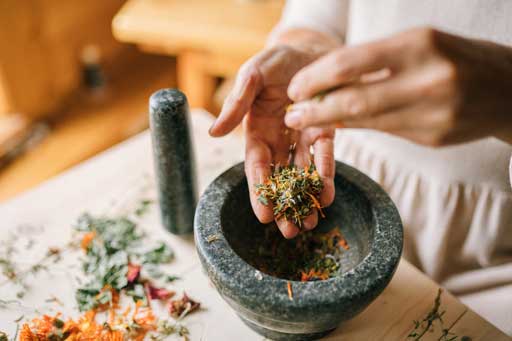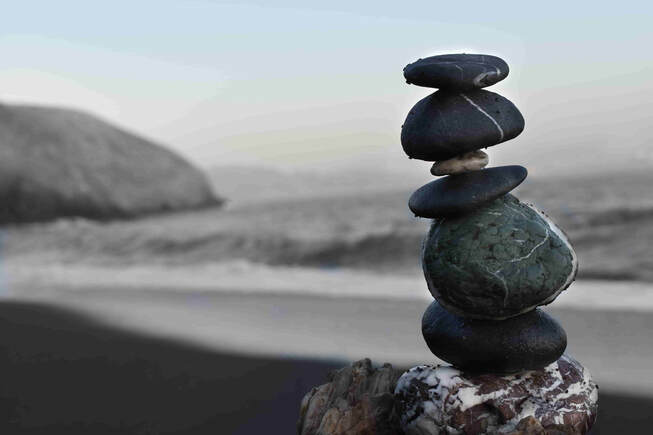What is Ayurveda?
Ayurveda is the science of healing and longevity. Here we explore what is Ayurveda and the eight benefits of Ayurveda as a lifestyle and mindset.
Quick links:
Quick links:
Defining and understanding Ayurveda
Most websites and doctors offer a standard definition of Ayurveda. They define Ayurveda as the "science of life" or "knowledge of life". However, these definitions do not provide an adequate understanding of what is Ayurveda and why it is relevant to you. Therefore, an attempt is made below to explain Ayurveda understandable in accessible and practical terms.
Science of Self-Healing
Ayurveda offers us the possibility of becoming our own best doctor
Ayurveda is, first and foremost, the science of self-healing. This means that Ayurveda offers every individual the knowledge and tools to heal himself of most major health ailments. In other words, Ayurveda offers us the possibility of becoming our own best doctor, if one chooses to be. The alternative, of course, is to remain reliant on others for your health and healing, thereby fostering a dependency that disempowers us from truly taking control of our quality of life
Prevention over Cure
Ayurveda fundamentally concerned with preventing disease
Ayurveda is a system of healthcare that emphasizes 'prevention over cure'. It is fundamentally concerned with preventing disease, so as to enable each individual to enjoy the fullest experience of life and the fullest expression of his or her consciousness. If we are sick, we cannot express ourselves fully and we cannot experience the joy, happiness and inner freedom that accompanies good health. However, Ayurveda also says that we should not wait to get sick before we take responsibility for our own health. Rather, we must incorporate in our lives certain routines, such as detoxification, and certain habits, like eating at fixed times, in order to prevent ill health in the first place. Therefore, if you are willing to learn and apply many of the dietary and lifestyle recommendations found in Ayurvedic tradition and philosophy, you will be able to prevent the common causes of premature aging and an unnatural or untimely death.
Traditional Medicine in India
Ayurveda is a form of traditional medicine in India.
Ayurveda is a form of traditional medicine in India which recognises that, over millennia, we grew and evolved with the plants. Over millennia, the rhythm of life was determined by the seasons, the weather, and the rising and setting of the sun. The early "seers" of ancient India had observed that good health was essentially a function of the extent to which we were in harmony with nature and its cycles. And so it came to be that Ayurveda became a "tradition" of living in harmony with nature. And although life has changed significantly in modern times, the science of living in harmony with the outer world has not changed much. And the medicines that we require to heal ourselves do not necessarily need to be manufactured in a lab because they are available to us in the natural world. This is traditional medicine: finding your cure in the plants, in the seasons, in the cycles of day and night, in the natural world.
World's Oldest Living System of Healthcare
Ayurveda: A living tradition rooted in time-tested wisdom.
We live in a world where health fads and trends are continually changing. We live in a world where public health recommendations related to diet and nutrition are determined by special interest groups. We live in a world where healthcare is big business and, therefore, the prescriptions and public messaging need to serve the interests of shareholders, not patients and consumers. And what we come to accept as "truth" today will be presented as "false" tomorrow or perhaps a decade from now. In Ayurveda, we would call this collective psychosis a "vata" disorder, where commonly-accepted health information changes like the wind.
But unlike the vicissitudes of modern healthcare or "mainstream" healthcare, the trees of Ayurveda do not break with the wind because they have been firmly rooted in the soils of India for 5,000 years. No other medicinal system is as old as Ayurveda and still so widely practiced. That's why we can call Ayurveda a "living" tradition: it has never died. Even during the British occupation of India, the tradition could not be erased because it was a "living" tradition, transmitted orally from one sage to another, and practiced in day-to-day life. And if it is alive and well today, it is because it works. And the fact that it has been around for so long further proves that it is not just a fad or trend, but a credible, comprehensive and effective mind-body system of healthcare. Both proactive healthcare and reactive healthcare.
But unlike the vicissitudes of modern healthcare or "mainstream" healthcare, the trees of Ayurveda do not break with the wind because they have been firmly rooted in the soils of India for 5,000 years. No other medicinal system is as old as Ayurveda and still so widely practiced. That's why we can call Ayurveda a "living" tradition: it has never died. Even during the British occupation of India, the tradition could not be erased because it was a "living" tradition, transmitted orally from one sage to another, and practiced in day-to-day life. And if it is alive and well today, it is because it works. And the fact that it has been around for so long further proves that it is not just a fad or trend, but a credible, comprehensive and effective mind-body system of healthcare. Both proactive healthcare and reactive healthcare.
Oneness of Mind, Body, and Environment
Ayurveda is "holistic" health in the truest sense.
Ayurveda is "holistic" health in the truest sense. It recognizes and treats the mind, body and environment as one integrated and interactive system. What this means is that the mind affects the body; the body affects the mind; and the environment in which we live affects both body and mind. One cannot be addressed in insolation of the other. This is because the very same elements -- fire, air, water, earth, and space -- that are found in the external world (the environment) are found in our internal world (the body and mind).
Toxins: the Root Cause of Disease
In Ayurveda, the root cause of all diseases is "ama", a Sanskrit word meaning toxins or undigested matter. Ama results from our inability to digest certain foods; from the inability to convert food into energy; and from the inability to excrete or expel the residue from burning food as fuel.
Ayurveda tells us that when ama accumulates in the body, it is displaced and dispersed throughout the body and then it gets lodged in difficult-to-reach places. It hides in open spaces throughout the body and it interferes with natural biological processes. It causes various imbalances in the body that we tend to experience as pain, lethargy, weaknesses and other symptoms.
Irrespective of the ailment, the straight-and-narrow course of Ayurvedic treatment is: detox. Detoxify the body, detoxify the mind, and the ailment should go away or at least reduce, significantly. In other words, detoxification is a major component of Ayurvedic treatment and vital to the restoration and improvement of health.
Ayurveda tells us that when ama accumulates in the body, it is displaced and dispersed throughout the body and then it gets lodged in difficult-to-reach places. It hides in open spaces throughout the body and it interferes with natural biological processes. It causes various imbalances in the body that we tend to experience as pain, lethargy, weaknesses and other symptoms.
Irrespective of the ailment, the straight-and-narrow course of Ayurvedic treatment is: detox. Detoxify the body, detoxify the mind, and the ailment should go away or at least reduce, significantly. In other words, detoxification is a major component of Ayurvedic treatment and vital to the restoration and improvement of health.
Way of Life
Holistic Wellness for Life: Ayurveda's Comprehensive Approach to Health.
As earlier stated, Ayurveda places great emphasis on the prevention of ill health. And so it follows that Ayurveda offers extensive guidance on nearly every aspect of life, including diet, cooking, sleep, work, exercise, spirit, relationships, routines, habits, and the interactions between these realms. Perhaps no other system of healthcare is as ecumenical as Ayurveda in addressing matters related to our health.
Restoring Balance
Ayurveda is a system for restoring and maintaining balance.
Ayurveda is a system for restoring and maintaining balance. We have all heard the term "work-life balance". We all have experienced times in our life when work, education, sports or other material ambitions and activities were pursued in excess, disrupting our ideal of a "balanced life". But being busy in life, working excessively or being overburdened with some responsibility are not the only imbalances that we may experience. Ayurveda speaks of nutritional imbalances, energetic imbalances and even mental imbalances as being intimately connected to our health.
In Ayurveda, every person is comprised of three energy humours, three energy systems: vata (the principle of space and movement), pitha (the principle of conversion), and kapha (the principle of matter, stability and fluidity). When these three energy systems are balanced in the body and mind, we experience good health. When these three energy systems are out of balance, we experience ill health to the extent of the imbalance. So one of the jobs of an Ayurvedic doctor is to determine the imbalances present in his/her patient and then to recommend a course of action to improve and restore balance, thereby enabling the body and mind to function optimally. However, in the literature on Ayurveda, there is enough information available on the chief causes of imbalances to enable us to make certain lifestyle adjustments to bring about more balance. In short, we don't need to wait for an Ayurvedic doctor to tell us what to do and what not to do, if we are willing to do our research on Ayurveda and implement the wisdom therein.
In Ayurveda, every person is comprised of three energy humours, three energy systems: vata (the principle of space and movement), pitha (the principle of conversion), and kapha (the principle of matter, stability and fluidity). When these three energy systems are balanced in the body and mind, we experience good health. When these three energy systems are out of balance, we experience ill health to the extent of the imbalance. So one of the jobs of an Ayurvedic doctor is to determine the imbalances present in his/her patient and then to recommend a course of action to improve and restore balance, thereby enabling the body and mind to function optimally. However, in the literature on Ayurveda, there is enough information available on the chief causes of imbalances to enable us to make certain lifestyle adjustments to bring about more balance. In short, we don't need to wait for an Ayurvedic doctor to tell us what to do and what not to do, if we are willing to do our research on Ayurveda and implement the wisdom therein.
Eight Benefits of Ayurveda
Here we discuss the eight benefits of Ayurveda as a philosophy and as a way of life. Many of the benefits cited below are also true for Ayurvedic treatment but there is a subtle difference: Ayurvedic treatment is a periodic and time-bound activity, whereas Ayurveda is a lifestyle and mindset to be continually observed, managed, and improved upon. Discussed below are the eight benefits of Ayurveda as a lifestyle and mindset.
1. Better Quality of Life
Quality of life is fundamentally about living in a state of health, happiness, security and peace.
Quality of life is fundamentally about living in a state of health, happiness, security and peace. As we age, particularly after we cross age 30 or 40, certain aspects of our health start to diminish: sexual vigour, stamina, endurance, physical strength, mobility, flexibility, athletic skills, and other aspects of physical life. We start to develop nagging aches and pains that we accept as "normal" and just part of getting old. Ayurveda offers us tools to counteract the aging process, slow it down, and maintain mobility, flexibility, and a pain-free body even as we age.
2. Lifestyle Optimization
Lifestyle optimization is about getting the most out of daily life
Lifestyle optimization is about getting the most out of daily life: becoming more efficient; utilizing our time better; doing the right things at the right time; becoming more productive; identifying self-sabotaging behaviour and making adjustments; and making incremental improvements to our lifestyle through, for example, adopting one new positive habit a month. If you are wondering how to get more out of life and how to become more efficient and productive, Ayurveda offers a number of pointed tips and prescriptions.
3. Better Diet
Ayurveda can teach us how to eat better.
Ayurveda can teach us how to eat better: the right times to eat; the right foods for our body type; the right combinations of foods; and what foods to eat to address certain ailments or health objectives. The Hippocratic dictum, "Let food be thy medicine and let medicine be thy food", is entirely consistent with Ayurvedic tradition and thought.
The bottom line is: If we can eat better, we will have more energy to do the things we need to do.
The bottom line is: If we can eat better, we will have more energy to do the things we need to do.
4. Better Sleep
Ayurveda can help us to identify the things that are impediments to good sleep.
As we get older, many of us tend to lose sleep. We lose sleep due to stress, wrong feeding habits, false beliefs, imbalances in the body, and other reasons. Ayurveda can help us to identify the things that are impediments to good sleep. Ayurveda also offers certain medicines, home remedies, and lifestyle tips that can enable us to take back control of our sleep. It may take time and nothing happens overnight, but if you truly want better sleep without getting hooked on sleeping pills, Ayurveda offers sustainable and healthy solutions.
The bottom line is: If we can sleep better, we can be more healthy and productive in our day-to-day lives
The bottom line is: If we can sleep better, we can be more healthy and productive in our day-to-day lives
5. Better Exercise
If we can exercise better, we will prolong youthfulness and mitigate the effects of the aging process
As we get older, exercise becomes more and more challenging. It becomes harder to lose weight. It becomes harder to maintain our stamina and do cardio for as long as we used to do. It becomes harder to devote time for exercise as our commitments grow. And if we are fortunate to achieve material success, secure that dream job, make crazy amounts of money, and/or secure that dream partner and dream relationship, we sometimes lose motivation to exercise because we have everything we want or we have other things making us happy. But the reality is that our health is partly dependent on how much we exercise and how regularly we exercise. Our brain needs it and the body needs it. And because it is so important, we need to get better at it. We need to get more efficient at exercise by exercising at the right times and in the right ways for our body type. This is where Ayurveda can help us: to exercise more efficiently and more appropriately for our true needs.
The bottom line is: If we can exercise better, we will prolong youthfulness and mitigate the effects of the aging process
The bottom line is: If we can exercise better, we will prolong youthfulness and mitigate the effects of the aging process
6. Detoxification
Detoxification is extremely important for maintaining good health.
As already explained, toxins are the root cause of disease according to Ayurveda. Therefore, detoxification is extremely important for maintaining good health. Ayurveda tells us that the body has certain in-built mechanisms that perform detoxification on a daily basis, naturally and often unconsciously. However, there are things that we can do to support our body's natural detoxification mechanisms, such as going to sleep before 10 pm and performing certain breathing exercises.
Ayurveda offers certain systems and routines to help us detoxify on a daily, weekly, monthly, seasonal and annual basis. One of these systems is called Panchakarma, a structured 21-day detox that involves special massages, blood purifying remedies, medicated enemas, ghee drinking, induced diarrhea and many other treatments.
The bottom line is: If we detox regularly, our body will be better able to prevent disease, resist viruses, and heal from sickness.
Ayurveda offers certain systems and routines to help us detoxify on a daily, weekly, monthly, seasonal and annual basis. One of these systems is called Panchakarma, a structured 21-day detox that involves special massages, blood purifying remedies, medicated enemas, ghee drinking, induced diarrhea and many other treatments.
The bottom line is: If we detox regularly, our body will be better able to prevent disease, resist viruses, and heal from sickness.
7. Pain Relief
Pain is an unavoidable, and often inconvenient, reality of life.
We have already discussed that pain is an unavoidable, and often inconvenient, reality of life. As much as we don't like it, we will have to deal with it. In dealing with it, we have essentially two choices: we can rely on others to treat our pain or we can learn the Ayurvedic techniques of self-care to manage and mitigate pain. One of these, for example, is self-massage. This is not to say that you should not go to a massage therapist or a physiotherapist or a chiropractor to help you overcome pain, especially if it is chronic and acute. However, Ayurveda teaches us that no one can know your body better than you know your body. Therefore, you can develop the ability to massage yourself, particularly in the areas where you can reach and which may be prone to stiffness, pain or discomfort.
Apart from self-massage, there are various herbal remedies, home remedies, supplements and decoctions in Ayurveda that enable us to manage pain and there are certain lifestyle injunctions that we can follow to prevent pain.
Bottom line: if we can learn to manage and mitigate pain on our own, we will not only save money but also, we will feel a sense of empowerment and independence, and we will enjoy a better quality of life.
Apart from self-massage, there are various herbal remedies, home remedies, supplements and decoctions in Ayurveda that enable us to manage pain and there are certain lifestyle injunctions that we can follow to prevent pain.
Bottom line: if we can learn to manage and mitigate pain on our own, we will not only save money but also, we will feel a sense of empowerment and independence, and we will enjoy a better quality of life.
8. Curing the Incurable
How Belief Can Influence Health Outcomes.
Many people are told that there is no cure for their condition. Many are told that they will have to live with a certain ailment for life and/or manage it through medication. In my case, I was told that I would need to see a chiropractor for the rest of my life, in order to manage my back pain and keep my spine in optimal health. This after having had two back surgeries already!
The reality is that someone else's prognosis of your condition does not have to become your reality. If you believe there is a cure and you are determined to find it, you can. The history of Ayurveda is replete with stories of people who have been miraculously healed from debilitating conditions and terminal illnesses, including cancer and auto-immune diseases. This is not to say that Ayurveda can cure each and every instance of cancer. The ability to recover from a serious illness depends not just on the doctor, the medicines and the course of treatment, but also, on the mindset, attitude, and cooperation of the patient. Very often, a healing must take place in the heart and mind before it can take place in the body.
But putting philosophy aside, I would like to emphasize two things: (1) never lose hope in finding a solution to your ailment, and (2) never let a doctor or anyone else tell you there is no cure. Whether you consider the curative potential of Ayurveda is another matter, but what is most important is your psychology, your attitude in facing any disease.
The reality is that someone else's prognosis of your condition does not have to become your reality. If you believe there is a cure and you are determined to find it, you can. The history of Ayurveda is replete with stories of people who have been miraculously healed from debilitating conditions and terminal illnesses, including cancer and auto-immune diseases. This is not to say that Ayurveda can cure each and every instance of cancer. The ability to recover from a serious illness depends not just on the doctor, the medicines and the course of treatment, but also, on the mindset, attitude, and cooperation of the patient. Very often, a healing must take place in the heart and mind before it can take place in the body.
But putting philosophy aside, I would like to emphasize two things: (1) never lose hope in finding a solution to your ailment, and (2) never let a doctor or anyone else tell you there is no cure. Whether you consider the curative potential of Ayurveda is another matter, but what is most important is your psychology, your attitude in facing any disease.
I do, of course, hope that you will consider Ayurveda and that when you are ready to visit an Ayurveda resort, that you will consider Ayurooms to help you find the right resort for your particular needs and objectives.
Wishing you health and abundance,
Alykhan Alidina
Wishing you health and abundance,
Alykhan Alidina
Last updated: 21st December 2021
Related Articles:
Related Articles:
|
|
The best decision you will ever makeThe best decision you could ever make is to decide to travel to India, go to a holistic health resort and experience Ayurveda. Why? Because you may discover that a seemingly incurable condition is suddenly gone. You may realize that there is, and always was, a cure to your ailment. You may soon realize that you don’t have to accept nagging aches and pains as a necessary part of the aging process. But don’t take our word for it. Hear it from our clients.
|
















